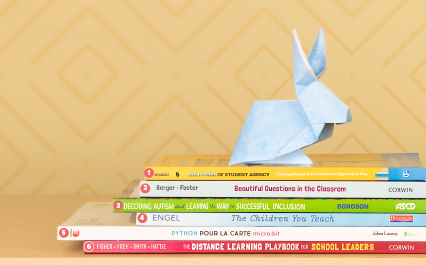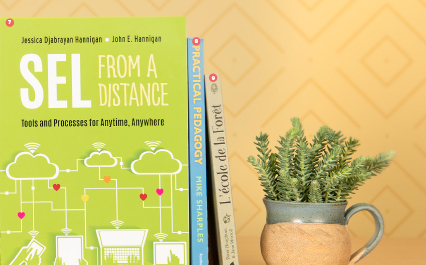Page Content

These resources are now available through the ATA library.
The ATA library has great resources for teachers in print and online. Library staff are happy to mail out whatever you need to wherever you are, and we prepay the return postage for you. Drop us a line at library@ata.ab.ca and let us know how we can help you with your teaching this year.
1. The Power of Student Agency: Looking Beyond Grit to Close the Opportunity Gap
This is a collection of first-person narratives by successful people that illustrates the need for teachers to help students take advantage of opportunities in addition to building grit and resilience.
2. Beautiful Questions in the Classroom: Transforming Classrooms into Cultures of Curiosity and Inquiry
The authors demonstrate how teachers can inspire joyful learning by developing beautiful questions for students and allowing students to develop more questions on their own.
3. Decoding Autism and Leading the Way to Successful Inclusion
In this holistic examination of autism in the inclusive classroom, author Barbara Boroson shares practical and responsive strategies for understanding and supporting students with autism as well as engaging with their families.
4. The Children You Teach: Using a Developmental Framework in the Classroom
Using real-life examples, author Susan Engel shows teachers how to look at student behaviour through a developmental lens to change what happens in the classroom.
5. Python pour la carte micro:bit SNT lycées, mathématiques, sciences
Deux fois plus petite qu’une carte de crédit et coutant moins de 20 €, la carte micro:bit est un nano-ordinateur pour initier les collégiens au codage et au pilotage de systèmes numériques. Cet ouvrage se concentre sur la programmation de la carte micro:bit avec Python, le langage officiel pour l’enseignement de l’informatique au lycée.
6. The Distance Learning Playbook for School Leaders: Leading for Engagement and Impact in Any Setting
This is a guidebook for principals and vice-principals that spans all aspects of leadership and translates them into working in virtual environments.

7. SEL from a Distance: Tools and Processes for Anytime, Anywhere
Focused on social and emotional learning (SEL), this well-organized book is full of practical tools that can be used virtually or in the in-person classroom.
8. Practical Pedagogy: 40 New Ways to Teach and Learn
Covering new pedagogies such as translanguaging, crossover learning, teachback, bricolage and rhizomatic learning, this book examines how pedagogies can be adopted in new ways for in-person and remote learning.
9. L’école de la Forêt : jeux et apprentissages dans les bois pour aventuriers en herbe
Les auteurs de ce livre proposent plus de 30 activités et jeux, au fil des saisons, développant les qualités sociales, émotionnelles et cognitives des enfants de 3 à 11 ans, dans le respect de soi, de l’autre et de la nature.
Information provided by ATA librarian Sandra Anderson
Your colleagues recommend
Teachers suggested these reads via Facebook.
Andrew Finlay
I am reading Building Thinking Classrooms in Mathematics by Peter Liljedahl. It is changing the way I am thinking of engaging my students in some critical problem solving in math.
Theresa Davidson
I just finished 21 Things You May Not Know about the Indian Act by Bob Joseph. This one helped to build my understanding of how I can better support reconciliation.
Carolyn Pawelko
I just finished reading Mankiller: A Chief and Her People by Wilma Mankiller and Michael Wallis. What a great biography of the first duly elected female Principal Chief of the Cherokee People, the constant struggles she faced against racism, sexism, health issues, and still she worked tirelessly throughout her lifetime to make things better for her nation.
Scott Carey
Hustle and Float by Rahaf Hargoush. This book looks at our obsession with being overworked and how we are still tied to outdated metrics of productivity and success that were born in the industrial revolution that not only don’t work, but can be counter-productive in a knowledge economy. The title is based on a river paddling analogy where sometimes you need to hustle on the river to avoid obstacles and keep afloat, but sometimes you just need to float and let the river do the work.
